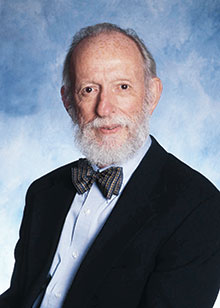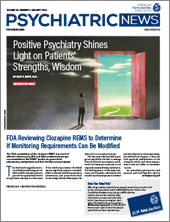John Talbott, M.D., a leader in academic and community psychiatry and past APA president (1984-1985), died November 29. He was 88.
Talbott had been the chair of the Department of Psychiatry at the University of Maryland from 1985 to 2000 and was editor of Psychiatric Services (formerly known as the Journal of Hospital & Community Psychiatry) from 1981 to 2004.
Talbott was known as a powerful voice for people with severe and persistent mental illness and an early and fierce critic of deinstitutionalization. In 1978 he published, The Death of the Asylum: A Critical Study of State Hospital Management, Services and Care.
Talbott was “a giant of modern psychiatry,” said APA CEO and Medical Director Saul Levin, M.D., M.P.A. “At the highest levels of our organization he was an early and effective advocate for those most in need. We are grateful for his leadership, and his legacy will always remind us of our mission.”
“John was a remarkable leader in community and academic psychiatry,” said past APA President Steven Sharfstein, M.D., who worked with Talbott and was a friend of many years. “He was one of the first to alert the field to the tragedy of indiscriminate deinstitutionalization and the resulting homelessness and criminalization of people with mental illness. He was a fabulous teacher and a mentor to many.”
Howard Goldman, M.D., who succeeded Talbott as editor of Psychiatric Services, called Talbott a “powerful force for good in our field” and “a champion of action and ideas.”
Goldman recalled, “After writing The Death of the Asylum, he chaired the task force within APA focused on what were then referred to as ‘chronic mental patients,’ charging the field to prioritize individuals with the most disabling mental disorders. The report on their work was published in 1978 by APA as The Chronic Mental Patient: Problems, Solutions, and Recommendations for a Public Policy. This volume and its recommendations were extremely influential in altering priorities for services within public mental health systems across the U.S. This represented an important reform in the delivery of psychiatric services nationally.”
Sharfstein agreed, calling The Chronic Mental Patient a “seminal contribution” to the understanding of problems associated with deinstitutionalization and best practices for care of people with severe and persistent mental illness in the community.
A July 2000 article in Psychiatric Services, by Richard Lamb, M.D., recalled the background leading up to the 1978 APA Conference on the Chronic Mental Patient and its aftermath. In that article, Lamb noted that Talbott “and others who planned and participated in the conference stressed throughout that their aim was action and not merely to be ‘a study group to produce a document that might be put on a shelf and ignored.’ In fact, Dr. Talbott lobbied vigorously and tirelessly after the conference to all who would listen. He spoke to [then President Jimmy Carter’s] President's Commission on Mental Health, and a copy of the recommendations of the conference was presented to that body. He testified before Congress and was active with the media.”
Talbott published hundreds of book chapters and papers, the last of which appears in the January issue of Psychiatric Services, written with Goldman and Psychiatric Services editor Lisa Dixon, M.D., about the 75th anniversary of the journal.
Talbott served as an Army captain in Vietnam from 1967 to 1968. He was active in Viet Nam Vets Against the War, for which he was the spokesperson at the Chicago Democratic National Convention in 1968. In later years he was an advocate for veterans with PTSD.
Talbott earned his medical degree at what was then known as Columbia College of Physicians and Surgeons. He trained in psychiatry and psychoanalysis at Strong Memorial Hospital in Rochester, the Presbyterian Hospital-New York State Psychiatric Institute, and the Columbia University Center for Psychoanalytic Training and Research.
After he stepped down as chair of psychiatry at the University of Maryland in 2000, Talbott undertook an initiative for the dean of the school of medicine that resulted in HELPERS-PRO Professionalism Project, which introduced aspects of medical humanism in every course and rotation in medical school.
Sharfstein recalled also that Talbott had a “fabulous wit and was great fun to be with.” As an undergraduate at Harvard, Talbott had been a staff writer for the
Harvard Lampoon. In later years he and his wife frequently visited Paris, where they had an apartment, and he wrote a blog titled “
John Talbott’s Paris” about restaurants in the French capital.
In an obituary he wrote for himself that was later distributed to friends and colleagues, Talbott wrote: “If my colleagues wish to hold a Remembrance at either Cornell-Columbia and/or the University of Maryland they may do so as long as they keep their remarks brief, funny, and outrageous. In no case should there be a tinge of religion, sanctity, or mourning—celebration of a life well-lived is what I’d like to be remembered by.” ■

